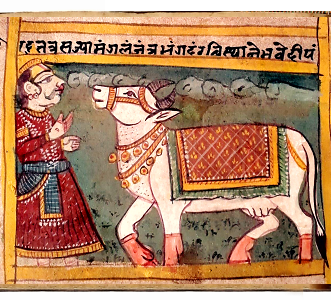
Nectar Drops from Śrīmad Bhāgavatam
False ego is the bodily concept of "I-ME-MINE"
The false ego of identifying one’s body as one’s self and of claiming things possessed in relationship with this body is called māyā. Māyā means "illusion," or that which is actually not.
False Ego Identification
False egoism is exhibited by thinking oneself to be the enjoyer of the world and thinking everything in the world to be meant for the enjoyment of one's self only. The whole materialistic world is moving under such false egoism of "I" and "mine," but the factual effect of chanting the holy name is to become free from such misconceptions.
The tight knot of false ego is due to ignorance. As long as one is ignorant about his true spiritual identity, he is sure to act wrongly and thereby become entangled in material contamination. This ignorance of factual knowledge can also be dissipated by Kṛṣṇa consciousness.
This false egoistic consciousness of "I am this body" at once develops after the child comes out of the womb. The mother and other relatives are awaiting the child, and as soon as he is born, the mother feeds him, and everyone takes care of him. The living entity soon forgets his true nature and becomes entangled in bodily relationships. The entire material existence is entanglement in this bodily conception of life. Real knowledge means to develop the consciousness of "I am not this body. I am spirit soul, an eternal part and parcel of the Supreme Lord." Real knowledge entails renunciation, or non-acceptance of this body as the self.
When a living entity forgets the constitutional nature of his relationship with God, he is at once overwhelmed by the external energy. This is the cause of his false ego, his false identification of the body with the self. Indeed, his whole conception of the material universe arises from this false identification with the body, for he becomes attached to the body and its by-products. To escape this entanglement, he has only to perform his duty and to surrender unto the Supreme Lord with intelligence and devotion and with sincere Kṛṣṇa consciousness.
In material existence the living entity falsely claims things to be his. He thinks, “I am the monarch of all I survey.” This is ignorance. Actually, nothing belongs to him. Even the body and the senses do not belong to him, for they are given to him by the grace of the Lord to satisfy his different propensities through the material energy. Nothing actually belongs to the living entity, but he becomes mad after everything, claiming, “This is mine. This is mine. This is mine.” Janasya moho ’yam ahaṁ mameti [SB 5.5.8]. This is called illusion. Nothing belongs to the living entity, but he claims that everything belongs to him. Lord Caitanya Mahāprabhu recommends that this false intelligence be purified (ceto-darpaṇa-mārjanam [Cc. Antya 20.12]). When the mirror of intelligence is polished, the real activities of the living entity begin. This means that when a person comes to the platform of Kṛṣṇa consciousness, his real intelligence acts. At that time he knows that everything belongs to Kṛṣṇa and nothing belongs to him. As long as one thinks that everything belongs to him, he is in material consciousness, and when he knows perfectly that everything belongs to Kṛṣṇa, he is in Kṛṣṇa consciousness.” (from purport to SB4.29.5)
A conditioned soul falsely thinks himself happy in the material world, but if he is favored by the instructions of an unalloyed devotee, he gives up his desire for material enjoyment and becomes enlightened in Kṛṣṇa consciousness. As soon as one enters into Kṛṣṇa consciousness, his desire for material enjoyment is at once vanquished, and he gradually becomes free from material entanglement. There is no question of darkness where there is light, and Kṛṣṇa consciousness is the light that dispels the darkness of material sense enjoyment.
The Śrīmad-Bhāgavatam (SB/3/25/10) discribes the false ego as follows:
TEXT 10
atha me deva sammoham - apākraṣṭuṁ tvam arhasi
yo ’vagraho ’haṁ mametīty - etasmin yojitas tvayā
Translation: Now be pleased, my Lord, to dispel my great delusion. Due to my feeling of false ego, I have been engaged by Your māyā and have identified myself with the body and consequent bodily relations.
Purport: The false ego of identifying one’s body as one’s self and of claiming things possessed in relationship with this body is called māyā. In Bhagavad-gītā, Fifteenth Chapter, the Lord says, “I am sitting in everyone’s heart, and from Me come everyone’s remembrance and forgetfulness.” Devahūti has stated that false identification of the body with the self and attachment for possessions in relation to the body are also under the direction of the Lord. Does this mean that the Lord discriminates by engaging one in His devotional service and another in sense gratification? If that were true, it would be an incongruity on the part of the Supreme Lord, but that is not the actual fact. As soon as the living entity forgets his real, constitutional position of eternal servitorship to the Lord and wants instead to enjoy himself by sense gratification, he is captured by māyā. This capture by māyā is the consciousness of false identification with the body and attachment for the possessions of the body. These are the activities of māyā, and since māyā is also an agent of the Lord, it is indirectly the action of the Lord. The Lord is merciful; if anyone wants to forget Him and enjoy this material world, He gives him full facility, not directly but through the agency of His material potency.
Therefore, since the material potency is the Lord’s energy, indirectly it is the Lord who gives the facility to forget Him. Devahūti therefore said, “My engagement in sense gratification was also due to You. Now kindly get me free from this entanglement.”
By the grace of the Lord one is allowed to enjoy this material world, but when one is disgusted with material enjoyment and is frustrated, and when one sincerely surrenders unto the lotus feet of the Lord, then the Lord is so kind that He frees one from entanglement. Kṛṣṇa says, therefore, in Bhagavad-gītā, “First of all surrender, and then I will take charge of you and free you from all reactions of sinful activities.” Sinful activities are those activities performed in forgetfulness of our relationship with the Lord. In this material world, activities for material enjoyment which are considered to be pious are also sinful. For example, one sometimes gives something in charity to a needy person with a view to getting back the money four times increased. Giving with the purpose of gaining something is called charity in the mode of passion. Everything done here is done in the modes of material nature, and therefore all activities but service to the Lord are sinful. Because of sinful activities we become attracted by the illusion of material attachment, and we think, “I am this body.” I think of the body as myself and of bodily possessions as “mine.” Devahūti requested Lord Kapila to free her from that entanglement of false identification and false possession.
Link to this page: https://prabhupadabooks.com/sb/3/25/10
***
Download PDF
False-Ego-identification.pdf



